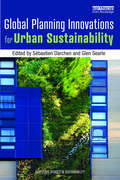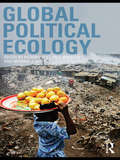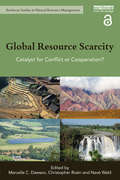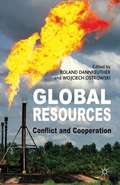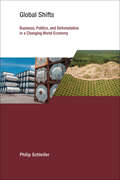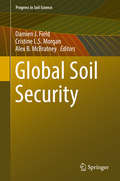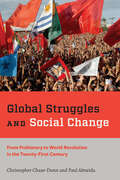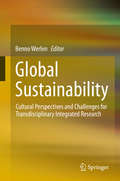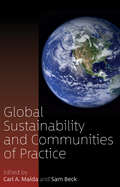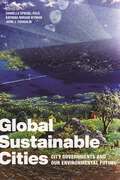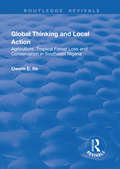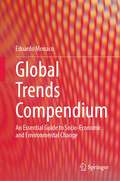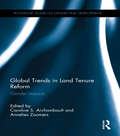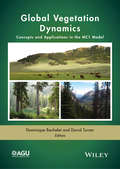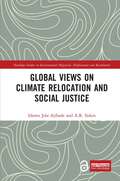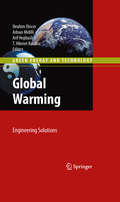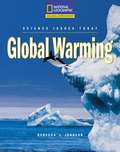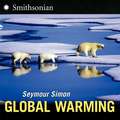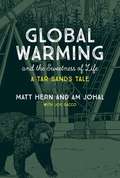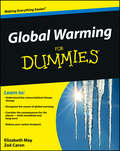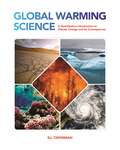- Table View
- List View
Global Planning Innovations for Urban Sustainability (Routledge Studies in Sustainability)
by Sébastien Darchen Glen SearleAs the world becomes more urbanised, solutions are required to solve current challenges for three arenas of sustainability: social sustainability, environmental sustainability and urban economic sustainability. This edited volume interrogates innovative solutions for sustainability in cities around the world. The book draws on a group of 12 international case studies, including Vancouver and Calgary in Canada, San Francisco and Los Angeles in the US (North America), Yogyakarta in Indonesia, Seoul in Korea (South-East Asia), Medellin in Colombia (South America), Helsinki in Finland, Freiburg in Germany and Seville in Spain (Europe). Each case study provides key facts about the city, presents the particular urban sustainability challenge and the planning innovation process and examines what trade-offs were made between social, environmental and economic sustainability. Importantly, the book analyses to what extent these planning innovations can be translated from one context to another. This book will be essential reading to students, academics and practitioners of urban planning, urban sustainability, urban geography, architecture, urban design, environmental sciences, urban studies and politics.
Global Political Ecology
by Richard Peet Paul Robbins Michael WattsThe world is caught in the mesh of a series of environmental crises. So far attempts at resolving the deep basis of these have been superficial and disorganized. Global Political Ecology links the political economy of global capitalism with the political ecology of a series of environmental disasters and failed attempts at environmental policies. This critical volume draws together contributions from twenty-five leading intellectuals in the field. It begins with an introductory chapter that introduces the readers to political ecology and summarizes the books main findings. The following seven sections cover topics on the political ecology of war and the disaster state; fuelling capitalism: energy scarcity and abundance; global governance of health, bodies, and genomics; the contradictions of global food; capital’s marginal product: effluents, waste, and garbage; water as a commodity, a human right, and power; the functions and dysfunctions of the global green economy; political ecology of the global climate, and carbon emissions. This book contains accounts of the main currents of thought in each area that bring the topics completely up-to-date. The individual chapters contain a theoretical introduction linking in with the main themes of political ecology, as well as empirical information and case material. Global Political Ecology serves as a valuable reference for students interested in political ecology, environmental justice, and geography.
Global Resource Scarcity: Catalyst for Conflict or Cooperation? (Earthscan Studies in Natural Resource Management)
by Marcelle C. Dawson, Christopher Rosin and NavNavé WaldA common perception of global resource scarcity holds that it is inevitably a catalyst for conflict among nations; yet, paradoxically, incidents of such scarcity underlie some of the most important examples of international cooperation. This volume examines the wider potential for the experience of scarcity to promote cooperation in international relations and diplomacy beyond the traditional bounds of the interests of competitive nation states. The interdisciplinary background of the book’s contributors shifts the focus of the analysis beyond narrow theoretical treatments of international relations and resource diplomacy to broader examinations of the practicalities of cooperation in the context of competition and scarcity. Combining the insights of a range of social scientists with those of experts in the natural and bio-sciences—many of whom work as ‘resource practitioners’ outside the context of universities—the book works through the tensions between ‘thinking/theory’ and ‘doing/practice’, which so often plague the process of social change. These encounters with scarcity draw attention away from the myopic focus on market forces and allocation, and encourage us to recognise more fully the social nature of the tensions and opportunities that are associated with our shared dependence on resources that are not readily accessible to all. The book brings together experts on theorising scarcity and those on the scarcity of specific resources. It begins with a theoretical reframing of both the contested concept of scarcity and the underlying dynamics of resource diplomacy. The authors then outline the current tensions around resource scarcity or degradation and examine existing progress towards cooperative international management of resources. These include food and water scarcity, mineral exploration and exploitation of the oceans. Overall, the contributors propose a more hopeful and positive engagement among the world’s nations as they pursue the economic and social benefits derived from natural resources, while maintaining the ecological processes on which they depend.
Global Resources
by Roland Dannreuther Wojciech OstrowskiThis EU-funded project examines the dynamics of conflict, collaboration and competition in relation to access to oil, gas and minerals. It involves 12 different institutions from across the EU and examines oil, gas and other minerals - spanning geology, technology studies, sociology, economics and political science.
Global Science: Earth/Environmental Systems Science
by John Christensen Teri ChristensenNIMAC-sourced textbook
Global Shifts: Business, Politics, and Deforestation in a Changing World Economy
by Philip SchleiferWhat global shifts in markets and power mean for the politics and governance of sustainability.In recent years, major shifts in global markets from North to South have created a new geography of trade and consumption, particularly in the agricultural sector. How this shift affects the governance of sustainability, and thus the future of the planet, is the pressing topic Philip Schleifer takes up in this book. The processes of twenty-first-century globalization are fundamentally changing the politics and governance of commodity production, Schleifer argues, with profound implications for the environment in the food-producing countries of the Global South. At the center of Schleifer's study are Brazil and Indonesia—two key sites of experimentation in new models of global environmental and commodity governance—where palm oil and soy supply chains have seen unprecedented degrees of private environmental governance in recent years. However, instead of transforming these industries, the diffusion of transnational sustainability standards has accompanied a worsening ecological crisis, with mounting evidence of increasingly strong links between deforestation and globalization in twenty-first-century agricultural trade. To uncover the causes of this governance failure, Schleifer develops a multi-level framework for analyzing how contemporary globalization is reconfiguring the political economies of such industries. The result is the first comprehensive analysis of the shift of global agricultural trade to the South and the deepening crisis of commodity-driven deforestation—and a complex and evolving picture of both the risks and opportunities for sustainability presented by this transformative shift.
Global Soil Security (Progress in Soil Science)
by Damien J. Field, Cristine L. S. Morgan and Alex B. McBratneyThis book introduces the concept of soil security and its five dimensions: Capability, Capital, Condition, Connectivity and Codification. These five dimensions make it possible to understand soil's role in delivering ecosystem services and to quantify soil resource by measuring, mapping, modeling and managing it. Each dimension refers to a specific aspect: contribution to global challenges (Capability), value of the soil (Capital), current state of the soil (Condition), how people are connected to the soil (Connectivity) and development of good policy (Codification). This book considers soil security as an integral part of meeting the ongoing challenge to maintain human health and secure our planet's sustainability. The concept of soil security helps to achieve the need to maintain and improve the world’s soil for the purpose of producing food, fiber and freshwater, and contributing to energy and climate sustainability. At the same time it helps to maintain biodiversity and protects ecosystem goods and services.
Global Struggles and Social Change: From Prehistory to World Revolution in the Twenty-First Century
by Paul Almeida Christopher Chase-DunnDeftly demonstrates how the rise and fall of social movements throughout history is closely linked to economic and political developments.In the early decades of the twenty-first century, an international movement to slow the pace of climate change mushroomed across the globe. The self-proclaimed Climate Justice movement urges immediate action to reduce carbon emissions and calls for the adoption of bold new policies to address global warming before irreversible and catastrophic damage threatens the habitability of the planet. On another front, since the 1980s, multiple waves of resistance have occurred around the world against the uneven transition from state-led development to the neoliberal globalization project. Both Climate Justice and Anti-Austerity movements represent the urgency of understanding how global change affects the ability of citizens around the world to mobilize and protect themselves from planetary warming and the loss of social protections granted in earlier eras.In Global Struggles and Social Change, Christopher Chase-Dunn and Paul Almeida explore how global change stimulates the formation and shape of such movements. Contending that large-scale economic shifts condition the pattern of social movement mobilizations around the world, the authors trace these trends back to premodern societies, revealing how severe disruptions of indigenous communities led to innovative collective actions throughout history. Drawing on historical case studies, world system and protest event analysis, and social networks, they also examine the influence of global change processes on local, national, and transnational social movements and explain how in turn these movements shape institutional shifts. Touching on hot-button topics, including global warming, immigrant rights protests, the rise of right-wing populism, and the 2008 financial crisis, the book also explores a broad range of premodern social movements from indigenous people in the Americas, Mesopotamia, and China. The authors pay special attention to periods of disruption and external threats, as well as the role of elites, emotions, charisma, and religion or spirituality in shaping protest movements. Providing sweeping coverage, Global Struggles and Social Change is perfect for students and anyone interested in globalization, international and comparative politics, political sociology, and communication studies.
Global Sustainability
by Benno WerlenThis book offers new perspectives of transdisciplinary research, in methodological as well as theoretical respects. It provides insights in the two-fold bio-physical and the socio-cultural global embeddedness of local living conditions on the basis of selected empirical studies from Latin America, Asia, Africa, Australia and Europe. The theoretical foundations of ecological research and sustainability policies were developed at the end of the nineteenth century. They are largely based on investigations of living spaces and the evolution and differentiation of varied life forms. This perspective is embedded in the practical and theoretical European problem situations of the past and lacks social and cultural differentiation. The transformation of spatial and natural relations as a result of the globalization process is so radical that new theories are needed to solve 21st century ecological problems. Moreover, in view of the lack of an ontologically sound and promising strategy for transdisciplinary problem solving, as well as an acceptable consideration of the power of cultural schemas relating to natural living's interpretations, there is a strong need to focus on sustainable social practices, habits and routines, rather than on predominantly living spaces or eco-topes. This book elaborates on the transdisciplinary approach by reflecting on the theoretical heritage and a global perspective of sustainability, by focusing on the primary role of a social approach in sustainability research and by putting emphasis on cultural dimension of sustainability. It postulates that global sustainability is grounded in a global understanding of our everyday activities.
Global Sustainability and Communities of Practice
by Carl A. Maida Sam BeckCollaboration between experts and the public is vital for effective community engagement aimed at improving the lives of the most vulnerable in society, whether at the local or global level. Using case-based and theoretical chapters that examine rural and urban communities of practice, this volume illustrates how participatory researchers and students, as well as policy and community leaders, find ways to engage with the broader public when it comes to global sustainability research and practice.
Global Sustainable Cities: City Governments and Our Environmental Future
by Danielle Spiegel-Feld, Katrina Miriam Wyman, and John J. CoughlinPerspectives from worldwide experts on how major cities across the globe are responding to the major environmental threats of our time, including global climate change Over half of the world’s population now lives in cities, and this share is expected to increase in the coming decades. With growing urbanization, cities and their residents face substantial environmental challenges such as higher temperatures, droughts, wildfires, and increased flooding. In response to these pressing challenges, some cities have begun to develop local environmental regulations that supplement national and environmental laws. In so doing, cities have stepped into a role that has been historically dominated by higher levels of government.Global Sustainable Cities takes stock of the policies that have been implemented by cities around the world in recent years in several key areas: water, air pollution, greenhouse gas emissions, and climate adaptation. It examines the advantages—and potential drawbacks—of allowing cities to assume a significant role in environmental regulation, given the legal and political constraints in which cities operate.The contributors present a series of case studies of the actions that seven leading cities—Abu Dhabi, Beijing, Berlin, Delhi, London, New York, and Shanghai—are taking to improve their environments and adapt to climate change. The first volume of its kind, Global Sustainable Cities is a critical comparative assessment of the actions that major cities in the global North and South are taking to advance sustainability.
Global Thinking and Local Action: Agriculture, Tropical Forest Loss and Conservation in Southeast Nigeria (Routledge Revivals)
by Uwem E. IteThis title was first published in 2001. Based on extensive local field research undertaken in and around the Cross River National Park in Nigeria, this book provides a socio-economic study of the tensions between agriculture and nature conservation. Taking a ’bottom-up’ approach and focussing on the farm household and the dynamics of forest farming at household level, it brings together a wealth of new information on the subject of tropical forestry, the causes and dynamics of tropical rain forest loss and the problematic relations between conservation authorities in National Parks and local people. Its conclusions raise important questions about practical ways forward in the development of such areas.
Global Trends Compendium: An Essential Guide to Socio-Economic and Environmental Change
by Edoardo MonacoThis Compendium was conceived as a “pocket compass”, a practical guide that may help readers to orientate themselves while they explore global affairs and attempt to make sense of the highly interconnected, multidimensional challenges of contemporary human development. The book is intended to be an accessible, concise, yet comprehensive reference for anyone who hopes to better understand today’s world and its dramatic complexity. The aim is to highlight a relevant selection of the demographic, socio-economic, geo-political, and environmental macro-dynamics that define our time, and to explore in a practical way the indicators that can be used to monitor their evolution over time. In general, this project stems from the need to apply “systemic thinking” to the study of the world and to develop a holistic perspective that can bridge the gap that for too long has existed across academic disciplines and their respective focuses. The macro-trends featured in the book shed light, in particular, on the change that has been occurring over time in the vast Global South – a portion of the globe that accounts for over 80% of the world’s total population. The book’s ultimate – although not exclusive – target audience is undoubtedly composed of undergraduate students of subjects such as political science, international affairs, international development, human geography and the like. In addition, the Compendium may benefit professionals in both public and private organisations as well as members of the general public seeking to acquire "global development literacy" in manners that are academically sound, but also accessible and concise.
Global Trends in Land Tenure Reform: Gender Impacts (Routledge ISS Gender, Sexuality and Development Studies)
by Caroline S. Archambault Annelies ZoomersThis book explores the gendered dimensions of recent land governance transformations across the globe in the wake of unprecedented pressures on land and natural resources. These complex contemporary forces are reconfiguring livelihoods and impacting women’s positions, their tenure security and well-being, and that of their families. Bringing together fourteen empirical community case studies from around the world, the book examines governance transformations of land and land-based resources resulting from four major processes of tenure change: commercial land based investments, the formalization of customary tenure, the privatization of communal lands, and post-conflict resettlement and redistribution reforms. Each contribution carefully analyses the gendered dimensions of these transformations, exploring both the gender impact of the land tenure reforms and the social and political economy within which these reforms materialize. The cases provide important insights for decision makers to better promote and design an effective gender lens into land tenure reforms and natural resource management policies. This book will be of great interest to researchers engaging with land and natural resource management issues from a wide variety of disciplines, including anthropology, sociology, development studies, and political science, as well as policy makers, practitioners, and activists concerned with environment, development, and social equity.
Global Vegetation Dynamics: Concepts and Applications in the MC1 Model
by David Turner Dominique BacheletGlobal Vegetation Dynamics: Concepts and Applications in MC1 model describes the creation in the mid 1990s, architecture, uses, and limitations of the MC1 dynamic global vegetation model (DGVM) that is being used by an increasing number of research groups around the world. The scientific foundation of most models is often poorly documented and difficult to access, and a centralized source of information for MC1, including the complete list of over eighty papers and reports with MC1 results will be useful to scientists and users who want to better understand the model and the output it generates. Global Vegetation Dynamics: Concepts and Applications in MC1 model will be a valuable resource for students and researchers in the fields of climate change science, conservation science, biogeochemistry and ecology, as well as for land managers looking for a better understanding of the projections of climate change impacts and of the tools that have been developed to produce them.he fire model, which was the first of its kind among dynamic global vegetation models; a brief history of the model creation; summaries of model results at the continental (North America), regional (Pacific Northwest), and local (Wind Cave NP and Sierra Nevada) scales; a description of its use to transform a state and transition model into its climate-smart version to help managers prepare for climate change challenges; and the description of an on-line tool (databasin.org) that provides snapshots as well as animated time series of its results. Finally, a complete bibliography (as of spring 2015) lists over 80 publications that include MC1 results. Global Vegetation Dynamics: Concepts and Applications in the MC1 model will be a valuable resource for students and researchers in the fields of climate change science, conservation science, and biogeochemistry and ecology, as well as for land managers looking for a better understanding of the projections of climate change impacts and of the tools that have been developed to produce them.
Global Views on Climate Relocation and Social Justice: Navigating Retreat (Routledge Studies in Environmental Migration, Displacement and Resettlement)
by Idowu Jola Ajibade A. R. SidersThis edited volume advances our understanding of climate relocation (or planned retreat), an emerging topic in the fields of climate adaptation and hazard risk, and provides a platform for alternative voices and views on the subject. As the effects of climate change become more severe and widespread, there is a growing conversation about when, where and how people will move. Climate relocation is a controversial adaptation strategy, yet the process can also offer opportunity and hope. This collection grapples with the environmental and social justice dimensions from multiple perspectives, with cases drawn from Africa, Asia, Australia, Oceania, South America, and North America. The contributions throughout present unique perspectives, including community organizations, adaptation practitioners, geographers, lawyers, and landscape architects, reflecting on the potential harms and opportunities of climate-induced relocation. Works of art, photos, and quotes from flood survivors are also included, placed between sections to remind the reader of the human element in the adaptation debate. Blending art – photography, poetry, sculpture – with practical reflections and scholarly analyses, this volume provides new insights on a debate that touches us all: how we will live in the future and where? Challenging readers’ pre-conceptions about planned retreat by juxtaposing different disciplines, lenses and media, this book will be of great interest to students and scholars of climate change, environmental migration and displacement, and environmental justice and equity.
Global Warming
by Ibrahim Dincer Adnan Midilli T. Hikmet Karakoc Arif HepbasliGlobal Warming: Engineering Solutions goes beyond the discussion of what global warming is, and offers complete concrete solutions that can be used to help prevent global warming. Innovative engineering solutions are needed to reduce the effects of global warming. Discussed here are proposed engineering solutions for reducing global warming resulting from carbon dioxide pollution, poor energy and environment policies and emission pollution. Solutions discussed include but are not limited to: energy conversion technologies and their advantages, energy management and conservation, energy saving and energy security, renewable and sustainable energy technologies, emission reduction, sustainable development; pollution control and measures, policy development, global energy stability and sustainability.
Global Warming
by John HoughtonThis work is a full survey of the present state of knowledge on global warming, and what can be done about it. The information and interpretation is not just one man's view, but represents the common mind of the scientific community. Many of the charts and diagrams are generated by the Met Office computer. Sir John Houghton is the author of The Physics of Atmospheres and Does God Play Dice?.
Global Warming
by Sir John HoughtonJohn Houghton's market-leading textbook is now in full color and includes the latest IPCC findings, making it the definitive guide to climate change. Written for students across a wide range of disciplines, its simple, logical flow of ideas gives an invaluable grounding in the science and impacts of climate change and highlights the need for action on global warming. Is there evidence for climate changing due to human activities? How do we account for recent extremes of weather and climate? Can global electricity provision and transport ever be carbon free? Written by a leading figure at the forefront of action to confront humanity's most serious environmental problem, this undergraduate textbook comprehensively explores these and other issues, allowing students to think through the problem, assess the data and draw conclusions on the action that should be taken, by governments, by industry and by each and every one of us.
Global Warming
by Susan PhilipOur earth is getting hotter and hotter. As a result, the polar ice caps are melting, the water levels in the oceans are rising, soon low-lying, small islands will vanish, there will be less and less rainfall so crops will die, and we humans will face shortage of food and drinking water. Animals and birds will soon start disappearing. If you thought this was the script of some new sci-fi movie, you are mistaken. All this is already happening as a result of Global Warming-the new threat Planet Earth is facing. This book is all about this scary natural phenomenon which is worrying scientists and countries around the world.
Global Warming (Nonfiction Reading And Writing Workshops)
by National Geographic Learning Staff Rebecca JohnsonDiscover the science behind global warming, its causes, and possible effects. Learn how human activities affect global temperatures and explore the good news and the bad news about our warming world.
Global Warming (Smithsonian-science)
by Seymour SimonAward-winning science writer Seymour Simon gives you a full-color photographic introduction to the causes and effects of global warming and climate change. <P><P>Earth's climate has always varied, but it is now changing more rapidly than at any other time in recent centuries. The climate is very complex, and many factors play important roles in determining how it changes. Why is the climate changing? Could Earth be getting warmer by itself? Are people doing things that make the climate warmer? <P><P>Supports the Common Core State Standards
Global Warming And The Sweetness Of Life: A Tar Sands Tale
by Joe Sacco Matt Hern Am JohalConfounded by global warming and in search of an affirmative politics that links ecology with social change, Matt Hern and Am Johal set off on a series of road trips to the tar sands of northern Alberta—perhaps the world's largest industrial site, dedicated to the dirty work of extracting oil from Alberta's vast reserves. Traveling from culturally liberal, self-consciously “green” Vancouver, and aware that our well-meaning performances of recycling and climate-justice marching are accompanied by constant driving, flying, heating, and fossil-fuel consumption, Hern and Johal want to talk to people whose lives and fortunes depend on or are imperiled by extraction. They are seeking new definitions of ecology built on a renovated politics of land. Traveling with them is their friend Joe Sacco—infamous journalist and cartoonist, teller of complex stories from Gaza to Paris—who contributes illustrations and insights and a chapter-length comic about the contradictions of life in an oil town. The epic scale of the ecological horror is captured through an series of stunning color photos by award-winning aerial photographer Louis Helbig. <P><P> Seamlessly combining travelogue, sophisticated political analysis, and ecological theory, speaking both to local residents and to leading scholars, the authors propose a new understanding of ecology that links the domination of the other-than-human world to the domination of humans by humans. They argue that any definition of ecology has to start with decolonization and that confronting global warming requires a politics that speaks to a different way of being in the world—a reconstituted understanding of the sweetness of life.
Global Warming For Dummies
by Elizabeth May Zoe CaronGet positive suggestions for practical solutions to this heated issue. Hotly debated in the political arena and splashed across the media almost 24/7, global warming has become the topic of the moment. Whatever one's views on its cause, there is no denying that the earth's climate is changing, and people everywhere are worried. Global Warming For Dummies sorts out fact from fiction, explaining the science behind climate change and examining the possible long-term effects of a warmer planet. This no-nonsense yet friendly guide helps you explore solutions to this challenging problem, from what governments and industry can do to what you can do at home and how to get involved.
Global Warming Science: A Quantitative Introduction to Climate Change and Its Consequences
by Eli TzipermanA quantitative, broad, hands-on introduction to the cutting-edge science of global warmingThis textbook introduces undergraduates to the concepts and methods of global warming science, covering topics that they encounter in the news, ranging from the greenhouse effect and warming to ocean acidification, hurricanes, extreme precipitation, droughts, heat waves, forest fires, the cryosphere, and more. This book explains each of the issues based on basic statistical analysis, simple ordinary differential equations, or elementary chemical reactions. Each chapter explains the mechanisms behind an observed or anticipated change in the climate system and demonstrates the tools used to understand and predict them. Proven in the classroom, Global Warming Science also includes “workshops” with every chapter, each based on a Jupyter Python notebook and an accompanying small data set, with supplementary online materials and slides for instructors. The workshop can be used as an interactive learning element in class and as a homework assignment.Provides a clear, broad, quantitative yet accessible approach to the science of global warmingEngages students in the analysis of climate data and models, examining predictions, and dealing with uncertaintyFeatures workshops with each chapter that enhance learning through hands-on engagementComes with supplementary online slides, code, and data filesRequires only elementary undergraduate-level calculus and basic statistics; no prior coursework in science is assumedSolutions manual available (only to instructors)
